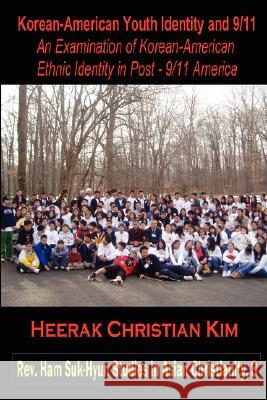Korean-American Youth Identity and 9/11: An Examination of Korean-American Ethnic Identity in Post - 9/11 America » książka
Korean-American Youth Identity and 9/11: An Examination of Korean-American Ethnic Identity in Post - 9/11 America
ISBN-13: 9781596890787 / Angielski / Miękka / 2008 / 232 str.
Korean-American Youth Identity and 9/11: An Examination of Korean-American Ethnic Identity in Post - 9/11 America
ISBN-13: 9781596890787 / Angielski / Miękka / 2008 / 232 str.
(netto: 120,03 VAT: 5%)
Najniższa cena z 30 dni: 126,74
ok. 16-18 dni roboczych
Bez gwarancji dostawy przed świętami
Darmowa dostawa!
"Korean-American Youth Identity and 9/11: An Examination of Korean-American Ethnic Identity in Post-9/11 America" by Professor Heerak Christian Kim of Asia Evangelical College and Seminary is a very important book in the area of ethnic studies in post-9/11 America. Although many books have been written on 9/11, there has not been adequate examination of its impact for particular ethnic groups. Even scholars of ethnic studies seem to ignore 9/11 as an event that is incidental to self-understanding and group identity of America's ethnic groups. This book is a step in the right direction in computing 9/11 into the study of ethnic identity and experience in America. This book specifically focuses on Korean-American identity, particularly in regards to Korean-American youth. However, this scholarly examination is further significant in its sensitivity to the ethnic experience of other Asian-Americans and in its examination of Korean-American identity as negotiated in the context of the larger dominant culture of America. And this book contributes further to the understanding of ethnic identity in the United States by devoting an important chapter to the dynamics of inter-ethnic relations between Korean-Americans and African-Americans. Besides being a monumental contribution to the understanding of ethnic identity in comparative terms, this book represents an important contribution to Korean-American studies. This book is the most up-to-date book on Korean-American youth identity and provides the scholarly community with valuable information regarding which direction to take future research regarding Korean-American identity and the Asian-American experience in the United States. As Asian-Americans are rising in terms of number and influence, the need for understanding their identity becomes important on academic, social, political, economic, and intellectual levels. This book is a very important book to meet the rising need that has been largely neglected in academia and in the publishing industry thus far. This book is an essential addition to all serious university libraries, public libraries, and private personal libraries of educated individuals.
"Korean-American Youth Identity and 9/11: An Examination of Korean-American Ethnic Identity in Post-9/11 America" by Professor Heerak Christian Kim of Asia Evangelical College and Seminary is a very important book in the area of ethnic studies in post-9/11 America. Although many books have been written on 9/11, there has not been adequate examination of its impact for particular ethnic groups. Even scholars of ethnic studies seem to ignore 9/11 as an event that is incidental to self-understanding and group identity of Americas ethnic groups. This book is a step in the right direction in computing 9/11 into the study of ethnic identity and experience in America. This book specifically focuses on Korean-American identity, particularly in regards to Korean-American youth. However, this scholarly examination is further significant in its sensitivity to the ethnic experience of other Asian-Americans and in its examination of Korean-American identity as negotiated in the context of the larger dominant culture of America. And this book contributes further to the understanding of ethnic identity in the United States by devoting an important chapter to the dynamics of inter-ethnic relations between Korean-Americans and African-Americans. Besides being a monumental contribution to the understanding of ethnic identity in comparative terms, this book represents an important contribution to Korean-American studies. This book is the most up-to-date book on Korean-American youth identity and provides the scholarly community with valuable information regarding which direction to take future research regarding Korean-American identity and the Asian-American experience in the United States. As Asian-Americans are rising in terms of number and influence, the need for understanding their identity becomes important on academic, social, political, economic, and intellectual levels. This book is a very important book to meet the rising need that has been largely neglected in academia and in the publishing industry thus far. This book is an essential addition to all serious university libraries, public libraries, and private personal libraries of educated individuals.











